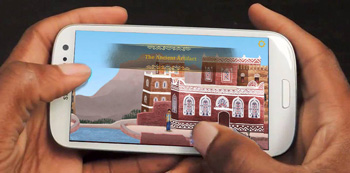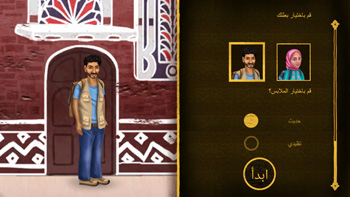
Bart Leijssenaar has spent a great deal of time in recent years grappling with war and peace in Yemen. He is a project manager from the Netherlands. With a team of Yemeni and Dutch developers, he is developing computer games on behalf of GIZ. The Arabia Felix games revolve around heroes who share the same challenging mission – to build peace. Leijssenaar explains how the project uses digitisation to train others in peace-building and conflict resolution.
Bart, tell us about the games you and your team have developed
Our international team has developed four games for young people, which take them on a journey of adventure from conflict to peace. They are promoted under the brand name ‘Arabia Felix’, which is the Latin name for Yemen and means both ‘fertile’ and ‘happy and blessed’. Two of our games, Eduo Run! and Eduo Quest, are aimed at a younger age group of 12 to 18-year-olds. Then there are the two apps The Secrets of Arabia Felix I and II, which we developed for young people in the 15-35 age group.
What do you aim to achieve with the apps?
The messages contained in the games are about peace-building and conflict resolution, although they are different in each game. The Eduo games are mainly designed for fun and entertainment, whereas The Secrets of Arabia Felix are a little more serious and contain a clearer message about peace. They are designed to teach users about the processes and types of behaviour that are key to promoting and maintaining peace in a society. The fun factor in the games encourages youngsters to keep playing.

So what are the games about exactly?
The game Eduo Run! is about collecting objects from all over Yemen and using these to rebuild a peaceful Yemen. But there is an evil monster in pursuit, whose aim is to destroy Yemeni culture. It’s a classic running game, which means players have to run to collect objects and overcome different obstacles.
Eudo Quest is similar in style, but based on several mini puzzles. It focuses on the importance of education for boys and girls in order to create a positive future. The Arabia Felix games for a slightly older age group are adventure games with more realistic characters. Here players have to progress through various levels of conflict resolution. They play the role of a hero who brings peace rather than destruction to a city. The hero then rebuilds the city, shows its people leadership and fights corruption. The challenge is a tough one, but achievable.

Are these games already available on the market?
Yes, we launched the first pilot game in early 2017 on Google Play Store. The other games apps have also been available for download from the store since late 2017.
Have you detected any positive developments as a result of the games?
It’s difficult for us at the moment to ascertain to what extent the games are actually changing users’ behaviour. But we are using our Facebook page to monitor this process. All the games are linked to our Facebook community, which had well over 14,000 followers by autumn 2017. Here, AIZ can tap into online discussions to see what messages young gamers draw from the games and whether they are changing attitudes.
Tell us about your team. How was the collaborative process?
I am a project manager in online gaming and I work in the Netherlands for Butterfly Works, where I’m responsible for collaborating with people sitting at workstations a long way away. So this was ideal for our project in Yemen. In the Netherlands we work closely with games developers from Radical Graphic (radicalgraphics.nl) and games designers and animators from Bomburo (bomburo.com). We have a team of 10 authors and gamers in Yemen, whose job is to set the games in the appropriate context. We also have a sound designer and several voiceover artists and illustrators. We also worked with a Jordanian illustrator and a sound effects specialist from the United Kingdom.
What were the biggest challenges?
Developing four online games in six months called for excellent communication and 100% commitment from all involved. We used the ‘scrum’ approach to structure the steps and activities: scrum is a framework used in agile software development. It’s a step-by-step approach to creating software products. Every week we held a ‘sprint meeting’ – the key format for this approach, and we had weekly meetings with all stakeholders so that all those involved could be kept constantly up-to-date with the process and all aspects of the project.
Would it be fair to describe your methodological approach as experimental?
We worked with end users and our creative team to shape the entire design process from start to finish. We applied design thinking in order to explore the problems we wanted to resolve and in so doing develop new and innovative ideas. We used prototypes and a range of options to help visualise these ideas, to facilitate communication with the whole team and put our ideas to the test. So, yes, working with end users to develop a creative process is essentially a fairly experimental approach. And doing it with partners working such a long way away was a whole new thing for us too. But it worked really well. There was a very strong feeling of togetherness in the team.
This project, on behalf of the Federal Ministry for Economic Cooperation and Development, is part of the GIZ project service package ‘Information Games’ to support strengthening of the peace process in Yemen. AIZ is responsible for implementation of Area of Action 3: Public relations and capacity development for peace-building and good governance.